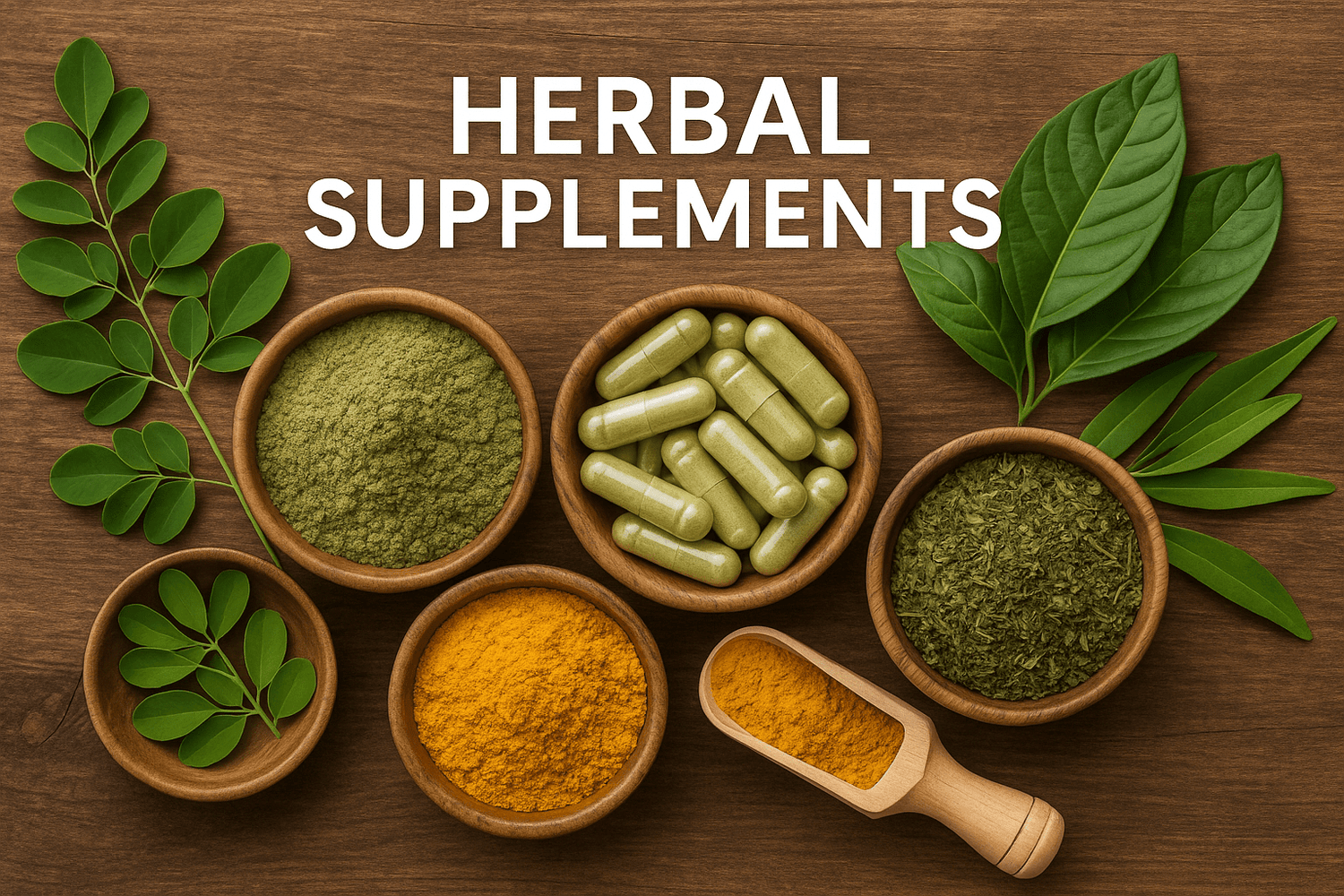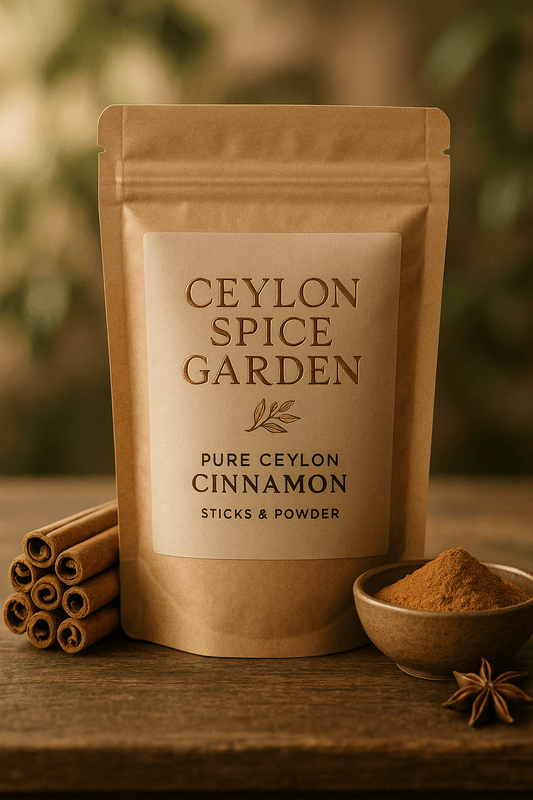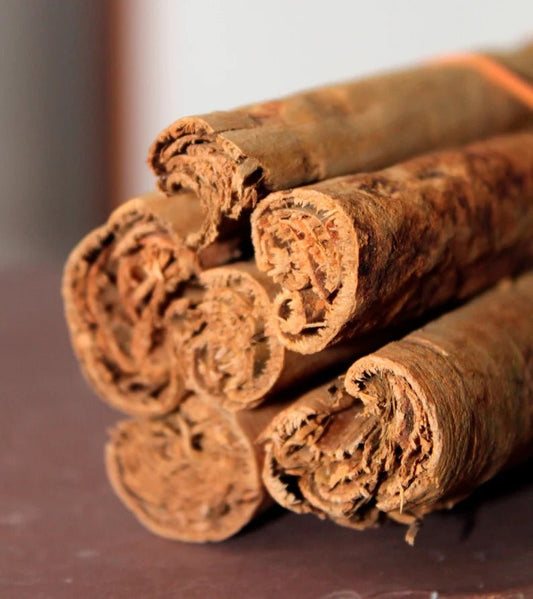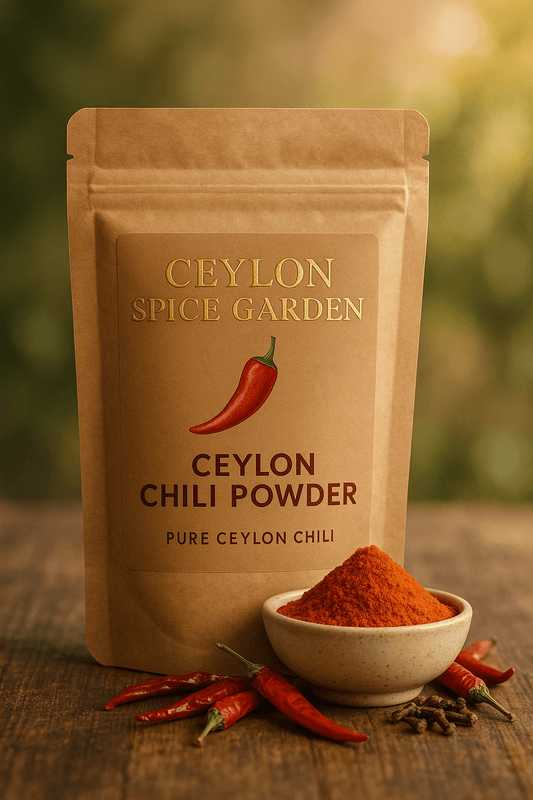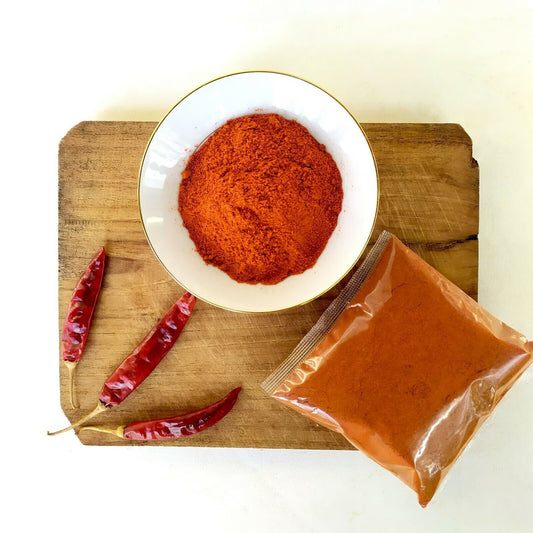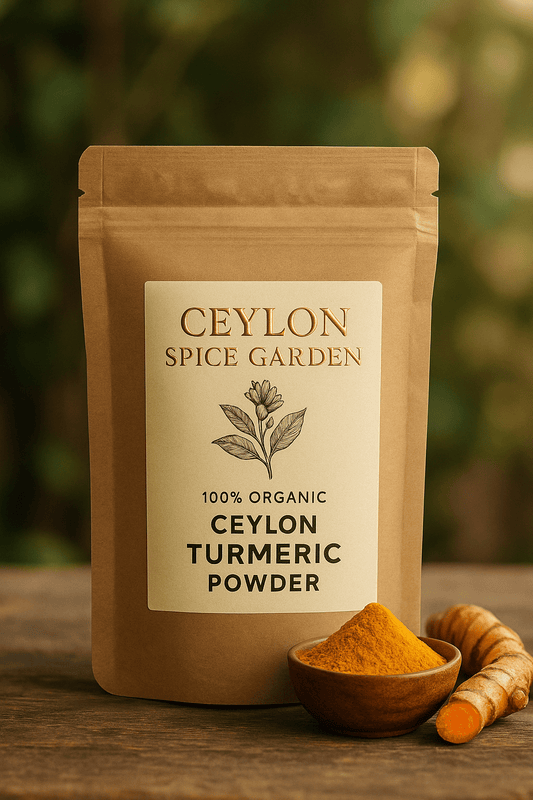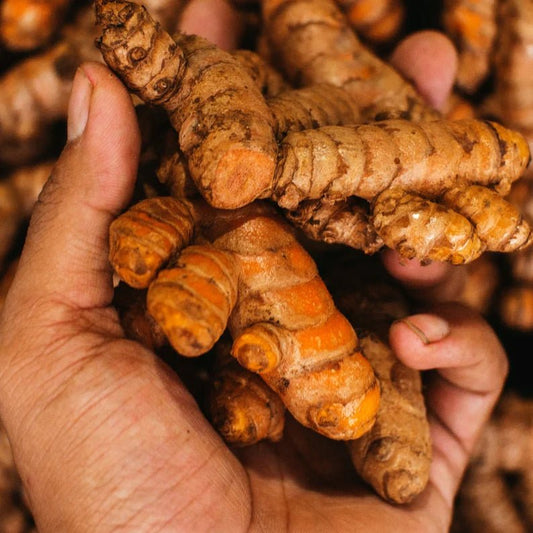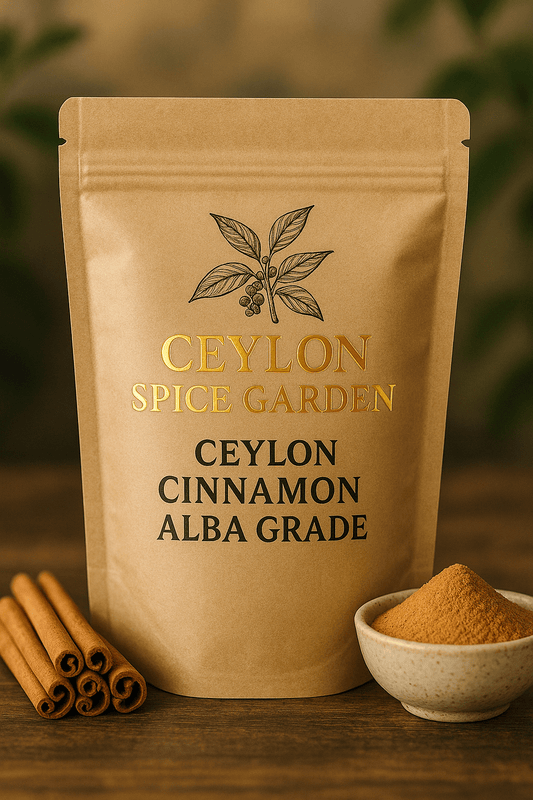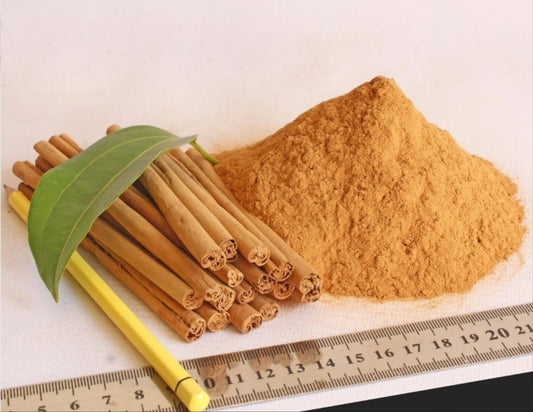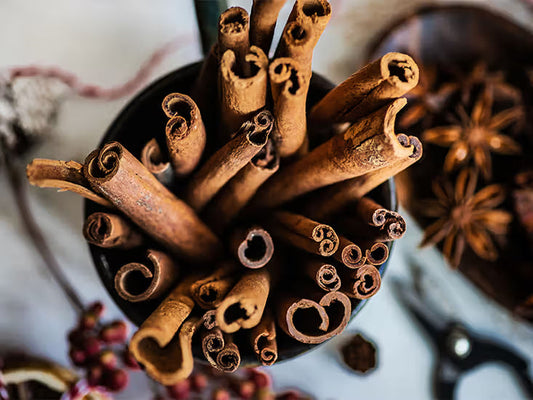
Ceylon Cinnamon Essential Oil Therapeutic Grade: Complete Guide | Ceylon Spice Garden
Ceylon Cinnamon Essential Oil Therapeutic Grade: Your Complete Guide to Benefits, Uses, and Quality
Ceylon cinnamon essential oil therapeutic grade stands as one of nature's most powerful wellness tools. Extracted from authentic Ceylon cinnamon (Cinnamomum verum) bark grown in Sri Lanka, this premium therapeutic-grade oil offers benefits that extend far beyond its warm, sweet aroma. With growing research supporting its health applications, understanding quality markers and proper usage becomes essential for anyone seeking natural health solutions.
Table of Contents
- What Makes Ceylon Cinnamon Essential Oil Therapeutic Grade?
- Science-Backed Health Benefits
- How to Identify True Therapeutic Grade Quality
- Practical Applications and Usage Methods
- Safety Guidelines and Precautions
- Buying Guide: What to Look For
- Proper Storage and Shelf Life
- Ceylon vs Cassia: Essential Oil Comparison
- Frequently Asked Questions
What Makes Ceylon Cinnamon Essential Oil Therapeutic Grade?
The term "therapeutic grade" refers to essential oils meeting specific purity and quality standards for safe topical and aromatic use. Ceylon cinnamon essential oil therapeutic grade must be extracted from true Ceylon cinnamon (Cinnamomum verum) rather than common cassia varieties.
According to the National Center for Biotechnology Information, Ceylon cinnamon contains significantly lower levels of coumarin compared to cassia varieties, making it safer for regular use. True therapeutic grade oil undergoes rigorous testing including Gas Chromatography-Mass Spectrometry (GC-MS) analysis to verify purity and chemical composition.
Key Characteristics of Therapeutic Grade Ceylon Cinnamon Oil
- 100% Pure: Contains no additives, carriers, or synthetic compounds
- Properly Extracted: Steam-distilled from Ceylon cinnamon bark to preserve active compounds
- Lab Tested: Verified through GC-MS testing for chemical composition
- Low Coumarin Content: Typically contains less than 0.04% coumarin versus 5-8% in cassia oil
- Certified Origin: Sourced from Sri Lankan Cinnamomum verum trees
Science-Backed Health Benefits
Research published in the Journal of Ethnopharmacology highlights Ceylon cinnamon's bioactive compounds, particularly cinnamaldehyde and eugenol, which contribute to its therapeutic properties.
Blood Sugar Management
Studies indicate that Ceylon cinnamon compounds may help improve insulin sensitivity and glucose metabolism. A 2018 systematic review in the Journal of the Academy of Nutrition and Dietetics found that cinnamon supplementation showed promise for glycemic control in individuals with type 2 diabetes.
Anti-Inflammatory Properties
The oil's high concentration of antioxidants helps combat oxidative stress. Research from the International Journal of Molecular Sciences demonstrates Ceylon cinnamon's ability to inhibit inflammatory pathways at the cellular level.
Cardiovascular Support
Ceylon cinnamon may contribute to heart health through multiple mechanisms. Studies suggest it can help support healthy cholesterol levels and maintain normal blood pressure when used as part of a healthy lifestyle.
Stress Reduction and Sleep Quality
The aromatic compounds in Ceylon cinnamon essential oil can promote relaxation. Research shows that cinnamon aromatherapy may help reduce stress and improve sleep quality through its calming effects on the nervous system.
Weight Management Support
Ceylon cinnamon may assist weight management efforts by helping regulate blood sugar levels, which can reduce cravings and support metabolic health.
Clinical Evidence Snapshot
A 2020 meta-analysis published in Clinical Nutrition reviewed 16 randomized controlled trials involving 1,006 participants. Results indicated that cinnamon supplementation significantly improved fasting blood glucose, total cholesterol, and triglyceride levels compared to control groups.
How to Identify True Therapeutic Grade Quality
Not all Ceylon cinnamon essential oils meet therapeutic standards. The International Organization for Standardization (ISO) provides quality benchmarks for essential oils, though the term "therapeutic grade" itself remains unregulated.
Essential Quality Markers
| Quality Indicator | What to Look For |
|---|---|
| Botanical Name | Labeled as "Cinnamomum verum" or "Cinnamomum zeylanicum" |
| Origin | Sri Lanka (formerly Ceylon) |
| Extraction Method | Steam distillation |
| Part Used | Bark (not leaf) |
| Testing | GC-MS tested with batch-specific reports available |
| Purity | 100% pure, no additives or dilution |
| Packaging | Dark glass bottle (amber or cobalt blue) |
⚠️ Warning Signs of Low-Quality Oil:
- Labeled simply as "cinnamon oil" without botanical name
- Suspiciously low price compared to market standards
- Clear or plastic bottle packaging
- No country of origin listed
- Missing GC-MS testing information
- Claims of being "100% therapeutic grade" without supporting documentation
Practical Applications and Usage Methods
Ceylon cinnamon essential oil therapeutic grade offers versatile applications when used properly. Always dilute before topical use and follow safety guidelines.
Aromatherapy Applications
- Diffusion: Add 3-5 drops to a diffuser for respiratory support and mood enhancement
- Inhalation: Place 1-2 drops on a tissue or cotton ball for personal aromatic use
- Room Spray: Mix 10-15 drops with water in a spray bottle for natural air freshening
Topical Applications
According to the National Association for Holistic Aromatherapy, Ceylon cinnamon bark oil should be diluted to 0.5-1% for topical use (3-6 drops per ounce of carrier oil).
- Massage Oil: Blend 3-4 drops with 1 oz carrier oil (coconut, jojoba, or sweet almond)
- Spot Treatment: Dilute heavily (0.5%) and apply to specific areas for targeted support
- Compress: Add 2-3 drops to warm water, soak cloth, and apply to muscles
Household Uses
- Natural Cleaner: Add 10 drops to cleaning solutions for antimicrobial properties
- Pest Deterrent: Diffuse or spray diluted solution to discourage insects
- Odor Neutralizer: Place drops on cotton balls in problem areas
Recipe: Warming Massage Blend
Ingredients:
- 2 oz sweet almond oil (carrier)
- 4 drops Ceylon cinnamon essential oil
- 6 drops ginger essential oil
- 4 drops black pepper essential oil
Directions: Combine all ingredients in a dark glass bottle. Shake well before each use. Apply to muscles after exercise or for comforting warmth. Avoid sensitive areas.
Safety Guidelines and Precautions
The U.S. Food and Drug Administration classifies essential oils as cosmetic ingredients, requiring proper labeling and safe usage practices.
Critical Safety Rules
⚠️ Always Follow These Precautions:
- Never Use Undiluted: Ceylon cinnamon bark oil is potent and can cause skin irritation
- Perform Patch Test: Test diluted oil on small skin area 24 hours before widespread use
- Avoid Sensitive Areas: Keep away from eyes, ears, nose, and mucous membranes
- Not for Internal Use: Do not ingest without professional medical guidance
- Pregnancy and Nursing: Consult healthcare provider before use
- Children: Not recommended for children under 6 years; use extra dilution for older children
- Pets: Many essential oils are toxic to pets, especially cats
Potential Side Effects
According to clinical toxicology research, possible adverse reactions include:
- Skin irritation or sensitization with improper dilution
- Allergic reactions in sensitive individuals
- Mucous membrane irritation if applied to wrong areas
- Photosensitivity (increased sun sensitivity)
Drug Interactions
Consult your healthcare provider before using if you take:
- Diabetes medications (may affect blood sugar)
- Blood thinners (may increase bleeding risk)
- Liver medications (cinnamon is metabolized by the liver)
Buying Guide: What to Look For
Purchasing authentic Ceylon cinnamon essential oil therapeutic grade requires careful evaluation. The market contains numerous mislabeled products, particularly cassia oil sold as Ceylon.
Trusted Quality Indicators
- Reputable Source: Buy from established suppliers with transparent sourcing, such as Ceylon Spice Garden, specializing in authentic Sri Lankan products
- Organic Certification: Look for USDA Organic or equivalent certification when possible
- Third-Party Testing: Verify that GC-MS reports are available upon request
- Proper Packaging: Dark glass bottles protect oil from light degradation
- Clear Labeling: Complete information including botanical name, origin, and safety warnings
Price Expectations
Authentic Ceylon cinnamon essential oil costs more than cassia due to limited growing regions and labor-intensive production. Expect to pay:
- $15-30 for 5ml of quality Ceylon cinnamon bark oil
- $25-50 for 10ml from premium suppliers
- Significantly higher for certified organic versions
Prices well below this range likely indicate cassia oil or diluted products.
Proper Storage and Shelf Life
Proper storage maximizes oil potency and extends shelf life. Essential oils are volatile compounds that degrade when exposed to light, heat, and oxygen.
Storage Best Practices
- Temperature: Store in cool, dark place (60-70°F ideal)
- Light Protection: Keep in original dark glass bottle
- Sealed Tight: Ensure cap is firmly closed after each use
- Avoid Humidity: Store away from bathrooms and humid areas
- Refrigeration: Optional for extended storage, but allow to reach room temperature before use
Shelf Life
When stored properly:
- Unopened: 3-4 years from production date
- After Opening: 2-3 years with proper care
- Signs of Degradation: Changed aroma, altered consistency, or cloudiness
Ceylon vs Cassia: Essential Oil Comparison
Understanding the difference between Ceylon and cassia cinnamon oils is crucial for safety and effectiveness. While both come from cinnamon species, their chemical compositions differ significantly.
| Characteristic | Ceylon (Cinnamomum verum) | Cassia (Cinnamomum cassia) |
|---|---|---|
| Origin | Sri Lanka | China, Indonesia, Vietnam |
| Coumarin Content | 0.004-0.04% | 5-8% |
| Safety Profile | Safer for regular use | Requires caution; liver concerns |
| Flavor Profile | Sweet, delicate, complex | Strong, spicy, one-dimensional |
| Price | Higher ($15-30/5ml) | Lower ($8-15/5ml) |
| Cinnamaldehyde | 50-63% | 75-90% |
| Therapeutic Applications | Broader, gentler | Limited by safety concerns |
The European Food Safety Authority has raised concerns about high coumarin intake from cassia cinnamon, making Ceylon the preferred choice for therapeutic applications.
About Ceylon Spice Garden
Ceylon Spice Garden specializes in authentic Sri Lankan spices and essential oils, sourcing directly from sustainable farms in Sri Lanka. With over 15 years of expertise in Ceylon cinnamon products, we ensure every item meets strict quality standards through third-party testing and organic certification. Our commitment to authentic Ceylon cinnamon products helps customers experience the true benefits of this remarkable spice.
Final Thoughts
Ceylon cinnamon essential oil therapeutic grade offers powerful natural support for wellness when sourced properly and used safely. Its lower coumarin content, rich aromatic profile, and backed research make it superior to cassia varieties for regular therapeutic use.
Remember that essential oils complement, not replace, professional medical care. Always purchase from reputable sources, verify authenticity through proper testing, and follow safety guidelines for dilution and application.
Whether you're using it for aromatherapy, topical applications, or household purposes, quality matters. Invest in authentic Ceylon cinnamon essential oil from trusted suppliers to experience its full therapeutic potential.
Frequently Asked Questions
"Therapeutic grade" indicates an essential oil meets quality standards for safe topical and aromatic use. While not an official regulatory term, it generally means the oil is 100% pure, properly extracted, and tested for chemical composition. True therapeutic-grade Ceylon cinnamon essential oil should include GC-MS testing results, proper botanical identification (Cinnamomum verum), and verification of Sri Lankan origin. Be cautious of marketing claims, as "therapeutic grade" remains unregulated by the FDA.
Internal use of essential oils should only occur under professional medical supervision. While Ceylon cinnamon is safer than cassia, the concentrated nature of essential oils makes them potentially harmful if ingested improperly. The highly concentrated compounds can irritate mucous membranes and digestive tissues. If you're interested in internal cinnamon benefits, consider using Ceylon cinnamon powder or sticks in food and beverages instead, which provides benefits without the risks associated with concentrated essential oils.
Authentic Ceylon cinnamon essential oil should be labeled with the botanical name "Cinnamomum verum" or "Cinnamomum zeylanicum" and list Sri Lanka as the origin. Check for GC-MS testing documentation, which verifies chemical composition and purity. The oil should come in a dark glass bottle, have a sweet, delicate aroma (not harsh or overly spicy like cassia), and be priced appropriately ($15-30 for 5ml). Request batch-specific testing reports from reputable suppliers. Authentic Ceylon cinnamon oil contains significantly less coumarin (under 0.04%) compared to cassia varieties.
Ceylon cinnamon bark essential oil should be diluted to 0.5-1% for safe topical application. This translates to 3-6 drops per ounce (30ml) of carrier oil. For sensitive skin or facial applications, use an even lower dilution of 0.25% (1-2 drops per ounce). Never apply undiluted essential oil directly to skin, as this can cause severe irritation or sensitization. Suitable carrier oils include coconut, jojoba, sweet almond, or grapeseed oil. Always perform a patch test on a small area before widespread use.
Pregnant and nursing women should consult their healthcare provider before using Ceylon cinnamon essential oil. While Ceylon cinnamon is generally considered safer than cassia, essential oils are highly concentrated and can cross the placental barrier. Some aromatherapy practitioners suggest avoiding cinnamon essential oil during pregnancy, particularly in the first trimester. If approved by your doctor, use only in highly diluted forms and avoid abdominal application. Pregnant women may safely use Ceylon cinnamon powder or sticks in normal culinary amounts.
Research suggests Ceylon cinnamon's active compounds, particularly cinnamaldehyde, may improve insulin sensitivity and glucose metabolism. Studies indicate it can help cells respond better to insulin and slow the breakdown of carbohydrates in the digestive tract. However, essential oil aromatherapy provides different benefits than internal consumption. For blood sugar support, Ceylon cinnamon powder taken orally shows more direct evidence. Essential oil can complement a diabetes management plan but should never replace prescribed medications. Always consult your healthcare provider before using cinnamon products for blood sugar management.
Essential oils, including Ceylon cinnamon oil, can be toxic to pets, especially cats. Cats lack specific liver enzymes needed to metabolize essential oils, making them particularly vulnerable. Dogs have better tolerance but can still experience adverse reactions. Symptoms of essential oil toxicity in pets include drooling, vomiting, tremors, difficulty breathing, and lethargy. If you diffuse essential oils in your home, ensure pets have access to rooms without diffusers and never apply essential oils to pet fur or skin. Consult a veterinarian before using any essential oils around animals.
Ceylon cinnamon bark oil and leaf oil have significantly different chemical profiles and uses. Bark oil contains 50-63% cinnamaldehyde, giving it a warm, sweet aroma and stronger therapeutic properties for blood sugar support and antimicrobial action. Leaf oil contains 70-85% eugenol, producing a spicier, clove-like scent. Bark oil is more expensive but preferred for therapeutic applications. Leaf oil is less costly and commonly used in perfumery and flavoring. For health and wellness purposes, always choose bark oil labeled "Cinnamomum verum bark."
When stored properly in a cool, dark place in its original dark glass bottle with the cap tightly sealed, unopened Ceylon cinnamon essential oil lasts 3-4 years from production date. After opening, it remains potent for 2-3 years with proper storage. Signs of degradation include changed aroma, altered color, cloudiness, or thickened consistency. Exposure to light, heat, oxygen, and humidity accelerates deterioration. For maximum shelf life, store bottles away from sunlight and heat sources, and consider refrigeration for long-term storage. Always check the production or expiration date when purchasing.
Essential oils are not recommended for cooking or baking due to their extreme concentration. A single drop of essential oil equals multiple teaspoons of ground spice. Instead, use Ceylon cinnamon powder or sticks for culinary purposes, which provide proper flavor without safety concerns. If you choose to use essential oils in cooking despite recommendations, only use oils specifically labeled as food-grade, start with a toothpick amount (dip toothpick in oil and stir into dish), and never add drops directly to food. Most therapeutic-grade essential oils are intended for external use only.
Yes, essential oils do expire or degrade over time, though they don't "spoil" like food. Ceylon cinnamon essential oil typically maintains potency for 2-3 years after opening when stored properly. The oil oxidizes when exposed to air, light, and heat, causing chemical changes that reduce effectiveness and may increase skin irritation potential. Using expired oil won't necessarily harm you but won't provide full therapeutic benefits. Discard oil if you notice significant changes in aroma, appearance, or consistency. Dating your bottle when opened helps track freshness.
